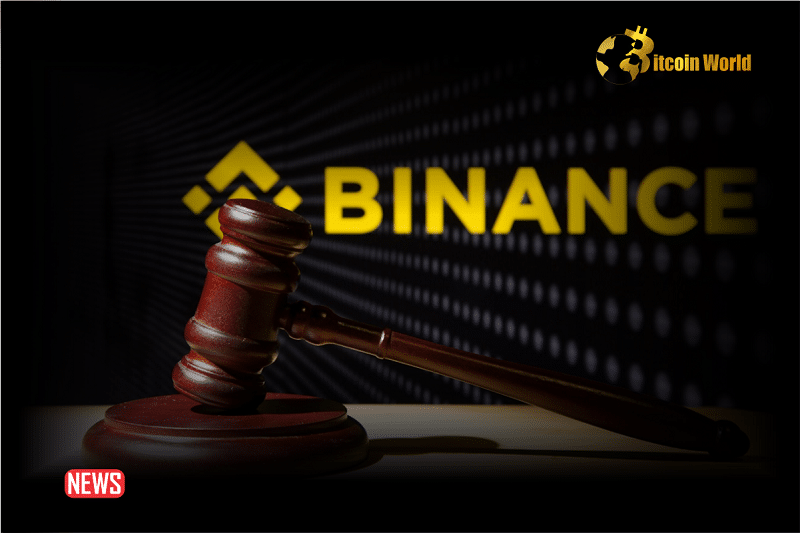Cryptocurrency giant Binance, already navigating a storm of regulatory challenges worldwide, has found itself in a peculiar predicament in Uzbekistan. Imagine getting sued for not paying a parking ticket – in Binance’s world, it’s a lawsuit over an $8,000 fine! Yes, you read that right. Uzbekistan’s National Agency for Prospective Projects (NAPP) is taking Binance to court because the crypto exchange allegedly ignored a modest fine issued earlier this year. Let’s dive into this unusual situation and see what’s brewing in Central Asia.
Why is Uzbekistan Suing Binance Over Such a Small Amount?
In January, NAPP, the regulatory body overseeing crypto in Uzbekistan, slapped Binance with a 102 million som fine. At current exchange rates, that’s roughly $8,200. For a company that rakes in billions in trading volume, this amount is, to put it mildly, peanuts. So, what’s the big deal?
The fine was levied because Binance was operating in Uzbekistan without the necessary license. Think of it like running a business without the proper permits. Uzbekistan, like many nations, is trying to establish a clear regulatory framework for cryptocurrencies. To operate legally within its borders, crypto exchanges need to be licensed by NAPP.
According to NAPP, Binance wasn’t just missing a license. The agency also claimed Binance failed to meet several critical requirements, including:
- Anti-Money Laundering (AML) and Know Your Customer (KYC) Compliance: These are crucial checks to prevent illicit activities and ensure the platform knows its users.
- Lack of Transparency on Leadership: Regulators need to know who is in charge for accountability.
- Proof of Reserves: Exchanges should demonstrate they have the assets to back up user funds.
Uzbekistan had previously blocked access to Binance, along with other major exchanges like Kraken, FTX, and Huobi, back in August 2022. This move signaled a clear message: operate legally or face restrictions. Despite the block and the subsequent fine, Binance seemingly continued to operate in Uzbekistan, prompting NAPP to take further action.
“Naturally, as we expected, they refused to pay”
Those are the words of Vyacheslav Pak, NAPP’s deputy director, speaking to local news outlet Gazeta. It seems Uzbekistan wasn’t entirely surprised by Binance’s apparent disregard for the fine. Now, they’re escalating the matter to the courts. Pak stated:
“Therefore, following the legislation of the Republic of Uzbekistan, we will submit a corresponding claim to the court, and a decision will be made.”
This legal maneuver isn’t just about the $8,000. It’s about enforcing regulatory compliance and sending a message that no entity, regardless of size, is above the law in Uzbekistan. NAPP aims to compel Binance to adhere to local regulations. As Pak emphasized, “We will formally ensure that Binance complies with the requirements of our legislation.”
Binance’s Global Regulatory Battles: Just Another Front?
This lawsuit in Uzbekistan comes at a particularly turbulent time for Binance. The exchange and its former CEO, Changpeng Zhao (CZ), are entangled in a web of legal battles and investigations across the globe. From the United States to Europe and beyond, regulators are scrutinizing Binance’s operations.
Remember the massive $4.3 billion settlement Binance reached with the US Department of Justice in November? That was a landmark moment, where both Binance and CZ admitted guilt to felony charges, including violations of the Bank Secrecy Act and failures in AML programs. CZ is now awaiting sentencing in the US.
Compared to these massive legal and financial challenges, an $8,000 fine and a lawsuit in Uzbekistan might seem insignificant for Binance. However, it highlights a crucial point: regulatory compliance is becoming increasingly important, and jurisdictions worldwide are taking crypto regulation seriously, regardless of the size of the infraction.
Key Takeaways from the Uzbekistan vs. Binance Saga:
- No Regulator is Too Small: Uzbekistan, while not a major global economy, is demonstrating that it will enforce its regulations against even the largest crypto players.
- Compliance is Non-Negotiable: Operating without a license and neglecting AML/KYC requirements has consequences, no matter how small the initial fine.
- Global Trend of Crypto Regulation: This case is another example of the growing global trend of governments tightening their grip on the crypto industry.
- Binance Under Pressure: The lawsuit adds to Binance’s mounting legal challenges, raising questions about their approach to regulatory compliance in different jurisdictions.
What’s Next?
It remains to be seen how the Uzbekistan court will rule. Will Binance finally pay the fine and seek to become compliant? Or will they continue to resist, potentially facing further penalties or even a complete ban in Uzbekistan? This seemingly minor case could set a precedent for how Binance and other global crypto exchanges navigate regulatory landscapes in smaller, but equally determined, nations.
One thing is clear: for Binance, and the crypto industry as a whole, the era of operating outside regulatory frameworks is rapidly coming to an end. Every jurisdiction, big or small, is asserting its right to regulate and ensure compliance. The case of the $8,000 fine in Uzbekistan might just be a small skirmish in a much larger battle for the future of crypto regulation.
#Binance #WRITE2EARN
Disclaimer: The information provided is not trading advice, Bitcoinworld.co.in holds no liability for any investments made based on the information provided on this page. We strongly recommend independent research and/or consultation with a qualified professional before making any investment decisions.




